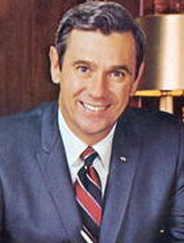‘Reubin The Good’ Memorialized
March 20, 2014
Family and friends remembered former Florida Gov. Reubin O’Donovan Askew as a loving, courageous, deeply devout public servant whose FBI code name “Integrity” captured the essence of the man memorialized at a packed church Wednesday.
Askew, who died Thursday at age 85, soothed racial tensions during school desegregation, shaped land and water conservation policies, renewed faith in a corrupt Supreme Court and shed light on government through the voter-approved “Sunshine Amendment” during his tenure as governor from 1971 to 1979.
Five former governors — Charlie Crist, Bob Graham, Bob Martinez, Buddy MacKay and Wayne Mixson — along with Gov. Rick Scott were among the hundreds of mourners who crowded into Faith Presbyterian Church in Tallahassee on a balmy afternoon to bid farewell to one of the state’s most beloved officials from modern times. Former Gov. Jeb Bush had a previous engagement in Tennessee. Past and current members of the Florida Cabinet, dozens of legislators, including House Speaker Will Weatherford and Senate President Don Gaetz, and former agency heads also attended.
 In a eulogy, Jim Bacchus, a reporter who went to work as a speechwriter for Askew at age 24, described his former boss as having “a unique combination of character, conscience and courage,” a sentiment reflected in anecdotes told by others before and after the hour-long afternoon service.
In a eulogy, Jim Bacchus, a reporter who went to work as a speechwriter for Askew at age 24, described his former boss as having “a unique combination of character, conscience and courage,” a sentiment reflected in anecdotes told by others before and after the hour-long afternoon service.
The memorial came in the midst of a week-long celebration of Askew’s life that, Bacchus said, widow Donna Lou Askew likened to “an inauguration but the speech has already been given.”
Askew’s message was one of love, borne of his belief that God gave him great abilities so that he could help others, Bacchus said.
“Bring people together. Don’t pull them apart,” Bacchus said.
Growing impassioned, Bacchus elaborated on Askew’s insistence that others remain true to their convictions, whatever the cost.
“Lead. What good does it do you to be in public office if you don’t lead? If you don’t take a chance? If you don’t tell the people what they need to hear and not just what they want to hear? Reubin Askew didn’t need to put his finger in the wind to find out what he believed,” he said. “He only wanted to be in office if he could get there in the right way so he could serve in the right way.”
Talbot “Sandy” D’Alemberte, a former president of Florida State University and former president of the American Bar Association who served in the Legislature when Askew was a senator and governor, remembered his friend as someone who was called “Reubin the Good.”
“The person who coined that phrase I suspect meant it as a cynical remark or a derisive remark. But the truth of the matter, he simply was good. If you think about Reubin Askew, you think of a person of good character, good judgment, and charm,” D’Alemberte said.
Askew will be remembered for “his public service calling and his convictions that Florida could be a model for diversity, for equal opportunity and for integrity,” D’Alemberte said.
“We love Gov. Askew, and today we promise ourselves that the things he valued and fought for will not be lost to Florida,” he said.
Delivering a third eulogy, Askew’s son Kevin called his father “a kind, gentle man” who taught his children “to treat other people as you want to be treated.”
The FBI assigned “Integrity”‘ to Askew as a code name, his son said.
“And that was the man that he was, was integrity,” he said.
Mingling outside the church after the memorial, those who served with or around Askew swapped tales of Askew, a teetotaler who did not allow alcohol to be served in the governor’s mansion and who did not permit cursing in his presence.
Ron Sachs, who also served as Askew’s speechwriter, remembered when Askew asked him for a copy of then-President Jimmy Carter’s interview with Playboy magazine in which the president admitted he had looked at women with “lust.” Sachs said he purchased a copy of the magazine and put it on Askew’s desk. Moments later, Askew called him back.
“He said, ‘I asked you to get me the Jimmy Carter interview with Playboy,’” Sachs said, adding that he told Askew the interview was in the magazine. “He said, ‘I don’t want the magazine.’ So I had to go copy the article with no ads, no photographs, and bring it to him.”
Askew was also stubborn, others recalled.
“When he thought something was right, he sort of put his head down and got it done,” said former Gov. Bob Martinez, who credited Askew with his career in politics. Martinez said Askew convinced him to accept an appointment to a water management board, which led to Martinez becoming Tampa mayor, governor and drug czar to President George H.W. Bush.
People who knew Askew said that, once they went to work for the governor, they remained in his service long after they were off his payroll. Askew, an avid sports fan and Florida State University alum, once ordered a former staffer to deliver play-by-play for a game over a cell phone because Askew could not watch it on television.
“When he called on you, you did what you were assigned,” D’Alemberte said.
Askew is survived by his wife, Donna Lou; children, Kevin Askew and Angela White; and several grandchildren and great-grandchildren. Askew will lie in repose on Thursday at his former home church, First Presbyterian Church Pensacola and will be buried with full military honors Friday in Pensacola.
by Dara Kim, The News Service of Florida



Comments